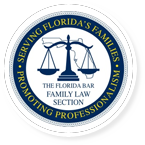There’s no easy answer as to how long an individual may be ordered to pay alimony, but it will depend on the length of the marriage. It’s slightly possible for a spouse to be awarded alimony by the court for a marriage lasting a minimum of seven years. The likelihood increases with the duration of the marriage. If alimony is deemed appropriate, Florida allows for five types:
- Temporary – Is awarded during the pending divorce and ends when the final divorce decree is delivered.
- Rehabilitative – This is awarded to enable a spouse to resume a career or profession so they can support themselves, or obtain training or education for that goal.
- Bridge the Gap – It begins after the divorce is finalized and lasts no more than two years to enable the spouse to get on their feet and meet their own needs.
- Durational – This provides support for a longer period of time, is dependent upon the length of the marriage, and can be in effect for up to 10 years depending on the court’s judgment.
- Permanent – An order for permanent alimony lasts until the court orders an end to it, one of the spouses dies, or the alimony recipient remarries.
Alimony in Florida is unpredictable. There are no set amounts and takes into account the incomes of both spouses. The amount can be modified in some instances should the spouse making the payments have significant changes to their financial situation. The ultimate decision on alimony is up to the judge, who is required to consider a variety of factors.
The court is responsible for determining if there’s a need for alimony and if the other spouse is able to pay it. Alimony won’t be mandated if either of those conditions isn’t present. The judge will consider elements encompassing the financial resources and earning capacity of the recipient, length of marriage, standard of living, and child support obligations.
Law Offices of Theodore H. Enfield, P.A.
Whether you need a Divorce, are dealing with Custody or Child Support issues, or need representation in a Personal Injury matter, the Law Offices of Theodore H. Enfield can confidently assist you. To learn more about how we can help you or to discuss the facts of your case with our attorneys, call 954-983-1443 to schedule your free consultation.
3107 Stirling Road
Suite 105
Fort Lauderdale, FL 33312
Fax: 954-983-1536
Email: [email protected]




